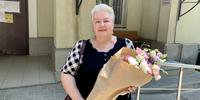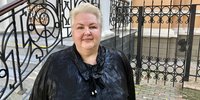Case of Ganusha in Rostov-on-Don
Filter
- #
The First Investigation Department (based in Rostov-on-Don) of the Main Investigative Directorate of the Investigative Committee of the Russian Federation initiates criminal cases for faith under Part 2 of Article 282.2 against Olga Ganusha (born in 1961), Lyudmila Ponomarenko (born in 1950) and Galina Parkova (born in 1970). According to the investigation, they participated in religious meetings, including religious services; provided living quarters for meetings; made donations; engaged in agitation among persons who are not followers of the religious teachings of Jehovah's Witnesses.
- #
The cases of Olga Ganusha, Lyudmila Ponomarenko and Galina Parkova are combined into one proceeding. They choose a measure of restraint in the form of a written undertaking not to leave. All women are formally charged under Part 2 of Article 282.2 of the Criminal Code.
- #
Investigator Kalnitsky separates the cases of Lyudmila Ponomarenko and Galina Parkova into separate proceedings. As a result, the criminal case of each believer will be considered separately in court.
- #
In the Voroshilovsky District Court of Rostov-on-Don, hearings begin in the case of Olga Ganusha. Judge Viktor Trofimov does not allow listeners into the hall due to the epidemiological situation.
The indictment is read out, the defendant expresses her attitude to the criminal prosecution and accusation. Ganusha considers this criminal case to be persecution for faith.
Detective A. A. Chaikin is interrogated as a witness. The witness does not answer the prosecutor's questions about which actions of the defendant were extremist in nature and whether she called for illegal actions, spreading her beliefs.
When asked by Ganusha whether the witness is familiar with the decision of the Supreme Court of the Russian Federation and what exactly was prohibited by this decision, Chaikin answers in the negative. The witness also reports that his task is to prove her relationship to the banned organization.
The prosecutor requests the disclosure of the testimony of the witness Chaikin, since after a while he cannot remember some details. The court ascertains the position of the parties and orders the testimony to be read.
- #
The court does not allow listeners, citing the epidemiological situation.
The defender submits a petition for re-interrogation of the detective A. A. Chaikin, the court refuses.
Witness A. V. Okhrimchuk is invited to the courtroom. After answering some questions, he refuses to testify in accordance with Article 51 of the Constitution of the Russian Federation. The judge threatens the witness with the institution of a criminal case. Ohrimchuk signs a waiver to testify and leaves.
The testimonies of prosecution witnesses who did not appear for questioning in the courtroom (a total of 6 people) are announced.
- #
A prosecution witness shall be questioned at the next closed court session. The state prosecutor asks the witness questions about the structure of the organization and hierarchy of Jehovah's Witnesses, printed literature, as well as Olga Ganusha's participation in religious meetings. The witness cannot confirm either the defendant's participation in specific religious meetings or the facts of her "extremist" activities.
- #
The defense is filing a motion for interrogation in the courtroom of specialist Astapov, whose testimony was read out earlier. The court refuses, referring to the fact that this proceeding does not consider the doctrine of Jehovah's Witnesses, but only determines the existence of a crime under Article 282.2 of the Criminal Code of the Russian Federation.
- #
At the request of the defense, material evidence is examined, including video recordings made in the defendant's apartment with the help of secret surveillance. The judge reviews 5 files with video recordings made in the defendant's apartment. The files contain recordings of a worship meeting, as well as recordings of telephone conversations of the defendant on domestic and religious topics with her friends.
The judge reviews the notebooks, memos, booklets, literature and Bibles seized from Ganusha in various translations. The text of a short letter presumably written by the defendant on the topic of hope for the future is announced. The text of the letter shows that Ganusha did not call for any action other than a Bible study.
The next meeting will be held on April 28, 2021 at 12:00. The defendant is scheduled to testify.
- #
The prosecutor asks the court to impose a suspended sentence of 3 years of suspended imprisonment, 3 years of probation and 1 year of restrictions. The next meeting, at which Olga Ganusha is scheduled to deliver her last speech, will be held in a month.
- #
To be published later.
The last word of the defendant Olga Ganusha in Rostov-on-Don - #
Judge Viktor Trofimov convicts Olga and sentences her to a suspended sentence of 2 years with a probation period of 1.5 years.
- #
The panel of judges of the Rostov Regional Court upholds the verdict of the first instance.
- #
- #
The Fourth Court of Cassation of General Jurisdiction in Krasnodar leaves the sentence of Olga Ganusha unchanged: 2 years of suspended imprisonment with a probationary period of 1.5 years.

